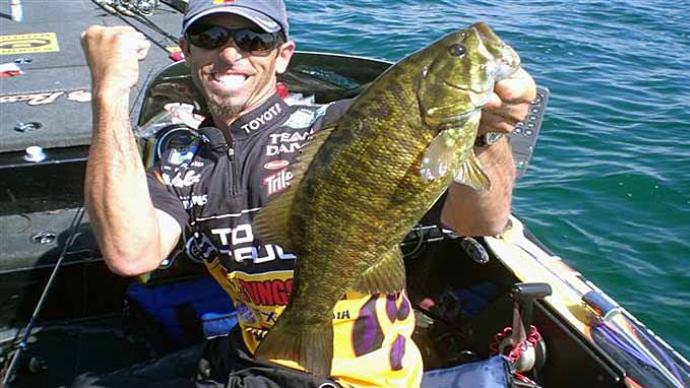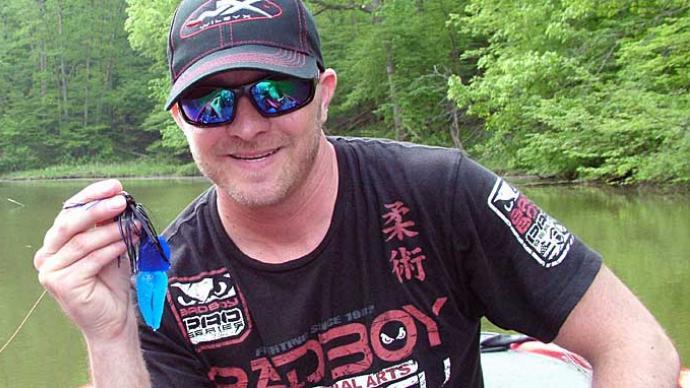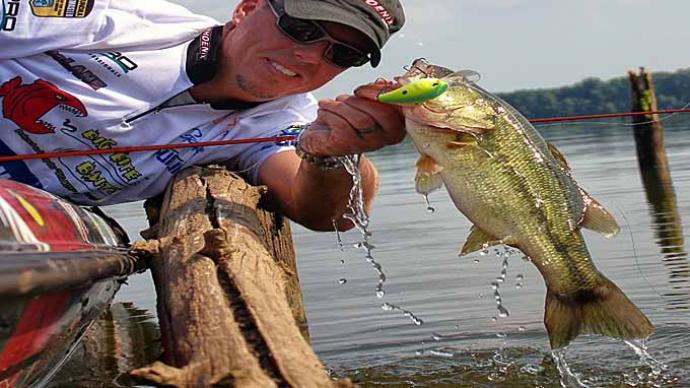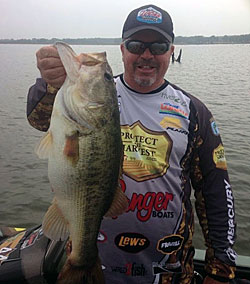
Arizona’s John Murray turned pro at 20 years old. He’d been fishing since he was 13 and is a natural. His parents bought him a bass boat and truck in high school, and he started guiding and fishing tournaments – making a lot of money. Back then, they paid $8,000 for the boat and $10,000 for the truck. When John finished 3rd in the U.S. Open, he made a big decision. He took that money, quit college, and started fishing professionally. His parents and teachers were not happy with his decision, but he made more than both of them that year. It was the right decision for him.
Then, Murray didn’t have a wife or kids. “With bass fishing, it’s all about putting in the time,” he says. “When you’re married with kids, it’s a huge deal because you are hardly ever home. You get out of it what you put into it.” Murray says he lived and breathed fishing until his son was born. Even with a wife and son, Murray still fishes professionally. With an RV, his wife and son came with him everywhere he went. Now that his son is old enough to start school, Murray is moving out of his home state of Arizona and transplanting his family to Tennessee.
“There’s no way to make a living at fishing if you’re west of Texas,” he says. When John started to fish, there were tons of draw tournaments out west. Now, he says, “it’s all dried up. Team tournaments are increasing, but if you want to make any money, you need draw tournaments. The East is very vibrant.” Since the tournaments are all out there, and he’s not a fan of driving 20+ hours each way and leaving his family behind alone, he’s moving.
Several pros continue to bring their families with them, living in RVs or trailers from February through September and home-schooling the kids, but that’s not for everyone. Financially and for stability, Murray feels he and his family should have a home base.
California angler Gary Dobyns took an entirely different course. When he was 20 years old, he had a wife and kid. “Being a bass pro is brutally hard on your family life,” he explains. “You’re gone all the time – fishing, pre-fishing, driving, doing shows for sponsors, whatever. You’re not there for the kids unless you take them with you, then you have to home school, and not all moms are up for that. It makes it hard for the kids to have friends, too.” His wife had a job, so she couldn’t leave because they needed the money.
Dobyns says the pro tour had 11 tournaments a year, so you would ALWAYS be fishing. You’re gone for months for practice, pre-fish, and tournaments. He says right now, with the Western Swing being at the Delta and Havasu, guys have been out there for a solid month already, practicing. To be good, he says, you must spend at least 200 days a year on the water.
One of the highest costs of going pro is the toll it takes on your family life. It takes a special lady to wait weeks for her man to come home or to live in a trailer and go from lake to lake with him. Some love the gypsy life. Some don’t. Those who don’t stay home. Then there are bills at home: housing, utilities, the usual stuff. Meanwhile, you have vast expenses of your own on the road. You need motels or an RV unless you can flop with a friend. Some guys camp most of the time or sleep in a van. You have to eat.
Boat expenses mount up as well. Gas and oil, service, wraps – it all adds up quicker than you think. Gary says he burns 20 to 30 gallons daily during a typical pre-fish. Tackle and equipment are crazy, he adds, especially things like electronics. Many guys think that once they win a tournament or two, they can line up sponsors and take care of a lot of their expenses. But nowadays deals on motors and boats are mostly discounts unless you are a huge name. Most sponsors give you product, and cash deals are scarce as hen’s teeth.
Murray says that when you start, you should buy a boat where you have a good relationship with the dealer. He may be able to help you get a sponsorship later on. Once you have a boat and truck, you must have insurance, and you must ensure your equipment and tackle are covered. “I’ve got 30-40 rods at $300 to $500 a pop and 40 tackle boxes full of baits,” he says. When he started, he had four boxes, and baits were much cheaper. People would have laughed at the idea of paying $25 or more for a single bait back then, but it’s common now.
“You must work your way to getting sponsors,” Dobyns says. “A lot of young guys end up living on credit cards and betting they’ll be able to win. Yeah, 50th place is good for $10K, but many excellent fishermen haven’t even made a check this year.” The life of a bass pro looks glamorous when he’s on stage holding that big trophy, but the average guy doesn’t understand all the sacrifices that guy made to get there. “I can guarantee you there are a lot of phenomenal fishermen who won’t make those kinds of sacrifices,” Dobyns says.
Another cost no one talks about, and almost no one thinks, is that turning pro could steal your love for bass fishing. Gary says they’ll all tell you no, but at some point, it can become just a job, and it’s not fun anymore. That, to me, would be paying the ultimate price.
The alternative? If you crave competition, you can be a local bass pro. The bad thing is that you probably won’t get any big endorsement money, but the costs are way less. You can still win money and do what you love, but you can keep a job, so life isn’t such a gamble. You may be gone for a week now and then, but then you’re home. Dobyns fishes tournaments all over the west and is highly regarded by everyone in the industry. Dobyns’ Rods are some of the best on the market, and fishermen know him and respect his opinions wherever he goes. His name and reputation as a great stick helped him build his rod business. He didn’t have to give up coaching Little League or other “dad stuff” guys on the road miss. There’s a lot to be said for being local.
If you’re already a local pro convinced you’re ready for the big time, be prepared to shell out about $200,000 to get started. Murray says you need an excellent background in fishing and a paid-off boat and truck if you want to go pro. “It’s easy to get in debt quick,” he warns, “it’s hard to get sponsors, and all the paying sponsors are back east.” When he started, he said, you could make $30K a year and make a profit, but nowadays, you have to make $100K to break even. Entry fees alone are phenomenal, and they are just the start. The key is PASSION, he says. If you have it, go for it. If it’s meant to be, you’ll make it. It’s all about enjoying the process.
If you are considering going pro, evaluate yourself honestly. Are you good enough to compete with Ike, KVD, and Skeet? If you are, go for it! But be sensible: sit down and figure out a budget. First, start with things that are what they are – like the price of a boat and truck, entry fees, and insurance. Then start listing things you have little control over, like housing. Are you willing to camp or live in a van? Many campgrounds have showers and electricity, so it’s not so bad. If not, you have to figure in motel rooms every night.
Then consider food. A professional angler is an athlete and needs to eat like one. You need to feed your body the right stuff to be at peak performance. Take a few week-long trips and carefully count the costs while on the road. You may not need a home or apartment if you don't have a family. If you don’t, then where will you stay when you aren’t on the circuit? Add up all these costs, including gas, oil, and truck and boat service. Keep a record of all your expenses, and be sure to include an emergency fund. If you’re that good, start banking your winnings from local tournaments until you have enough to fund a year of professional fishing. Then you don’t have to worry about money and can concentrate on fishing.
A Word About Sponsors
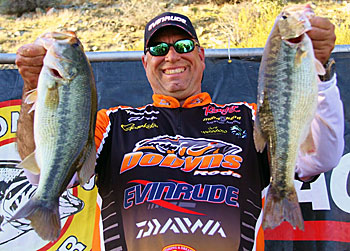
Gary Dobyns has experienced sponsorship from both sides of the coin. He has sponsors, and he IS a sponsor: Dobyns Rods has several pros on staff. Gary expects from them exactly what he gives all of his sponsors: promotion. Just because you win a local tournament with a particular bait, don’t expect that company to start loading you with free baits or sending you a check every month. Many bigger sponsors require you to turn in a record each month of shows or seminars you’ve done, tearsheets of articles you’re mentioned in (and where you’ve promoted them), and links to online videos and stories you’re in. Your life as a pro isn’t just fishing – it’s promoting your sponsors and your sport. Keeping yourself and your image clean is essential. Do something terrible, and the sponsors you worked so hard to get might drop you like a hot rock. On the other hand, you can enjoy years of a great relationship with sponsors. Gary and John have sponsors with whom they’ve had relationships for years. It’s a win-win situation, but you have to do your part. Companies are inundated with requests for money and sponsorships. You have to show them how you will make money for them if you want to get their attention.
Once you have a few great finishes under your belt and are starting to be known, be a pro when you ask for a sponsorship. Turn in a resume and include a list of the tournaments you fish, your finishes, tearsheets (copies) of any articles you’ve been in or have written, and a record of the shows and seminars you do. Indicate that you are willing to do shows for them as well. Be specific about what you would like them to do for you and what you are willing to do for them in return. You should have a folder for them with articles, tournament records, shows, etc. Make sure everything is spelled correctly, and the grammar is spot on. If you stink at that, hire someone to type it up. Read Ike’s article on sponsorship on BassResource.com. Be prepared to spend a lot of time doing seminars and talks to clubs when you aren’t fishing. It will be easy because you’ll talk about what you love, with people hanging on your every word. You’re a pro! Enjoy it!


